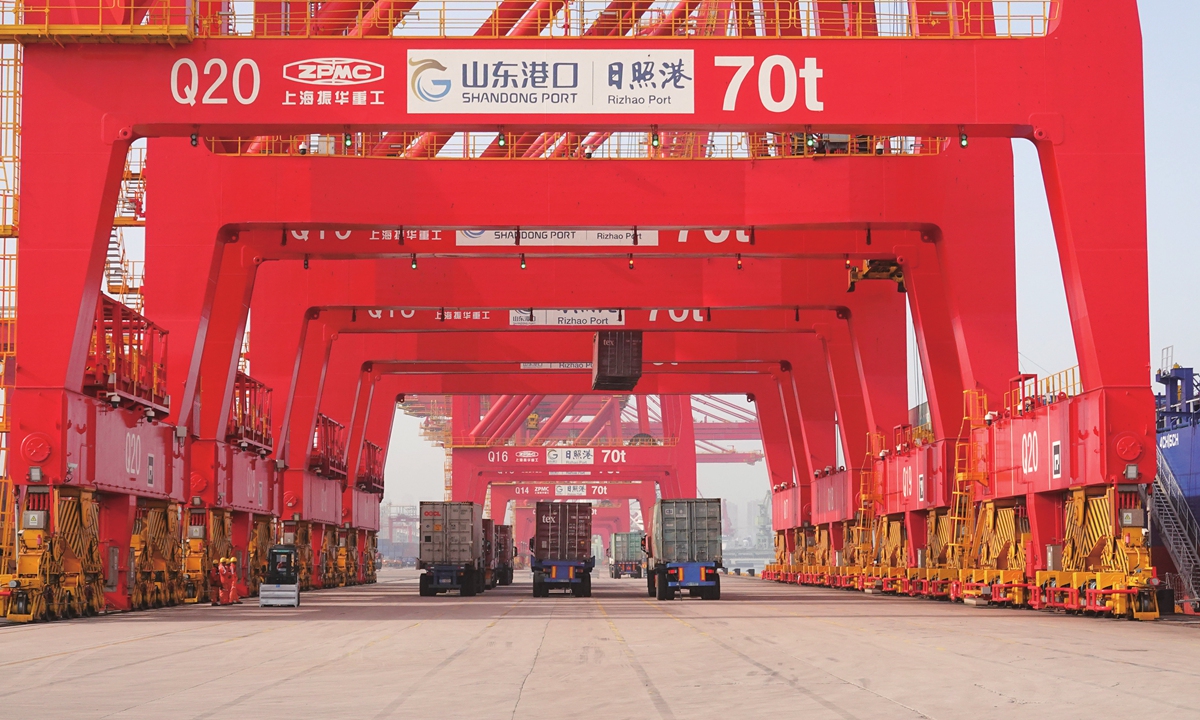Fitch’s move of cutting China’s credit outlook is politically biased, intellectually fraught

A snapshot of Rizhao Port, a major port for new-energy vehicle exports, in East China's Shandong Province Photo: VCG
US credit ratings agency Fitch's decision to downgrade China's sovereign credit rating outlook from stable to negative - which came shortly after US Treasury Secretary Janet Yellen's recent visit to China during which she complained about the country's "overcapacity" - is politically biased and intellectually fraught. They simply cannot comprehend the shift that Chinese authorities are now executing, namely toward more high-quality and high-tech growth.
International credit rating agencies are known to be politically biased and intellectually limited. They tend to favor governments that follow neoliberal policies, which they believe, will promote growth and fiscal health. However, since neoliberal policies limit the amount of debt incurred, the idea would be that the small amount of debt will be of relatively high-quality.
Chinese polices that promote long-term stable growth are the opposite of neoliberal policies. The country's pro-growth policies involve significant government activity and spending, particularly through investment in the country's people, infrastructure and productive economy. This would require substantial borrowing and deficits. However, the growth produced would make this debt sustainable. This understanding is reflected in China's Ministry of Finance's statement that Fitch's downgrade "failed to effectively anticipate the positive role of fiscal policies in promoting economic growth."
Historically, Western financial institutions have been known to want to invest in and profit from markets that they do not care to know very much about. This also applies to their relationship with China. While they follow developments in China more closely than other countries, the simple fact is that they simply cannot comprehend the shift that Chinese authorities are now executing: toward more high-quality and high-tech growth.
They do not understand how it will work and produce growth. They think that now that the phase of expanding housing investment is over, there is no further strategy for growth, at least not one they can grasp. Finally, they tend to think that only private investment produces growth, not public investment, which they tend to regard merely from the point of view of government expenditure.
The fact is that China's foreign debt is relatively small, so even if some investors are turned away by it, this would be hardly a big problem. And the fact is that the first quarter growth rate of 5.3 percent has been higher than analysts' projections and is a strong start to the year. I expect this to continue, and if it does, there is no doubt Fitch will have to change its outlook to positive.
The "China collapse theory" arises from neoliberal ideology. The ideology prevents Western commentators from seeing that China's economic strategy, which is fundamentally not neoliberal but involves well-judged and pragmatic forms of state intervention to keep growth going and improving in quality, cannot be acknowledged by the West without fundamentally questioning neoliberal policy. And they cannot afford to question neoliberal policy because Western governments are creatures of the corporate and financial elites that profit without producing and like to keep things that way.
I believe the Chinese central government has the right idea. It is trying to direct funds into high technology sectors and support those industries and the rest of the economy. When Western governments intervened more heavily in their economies in the first three decades after the World War II, they had consistently higher growth than they did under neoliberalism after 1980. Another reason why China's approach is the correct one is that many of the new technologies, such as information technology, are best developed as public utilities or heavily regulated private industries. China's successes in them will serve as an example for the rest of the world.
The article is based on an interview with Radhika Desai, Professor at the Department of Political Studies of the University of Manitoba, at a recent symposium in Beijing. [email protected]

Radhika Desai Photo: Courtesy of Radhika Desai
本文地址:http://dalian183.cn/html/677d299106.html
版权声明
本文仅代表作者观点,不代表本站立场。
本文系作者授权发表,未经许可,不得转载。